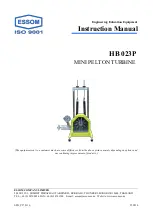
ESSOM COMPANY LIMITED
C
(b) After maintenance is carried out ensure that the machine guards are replaced back in service. Do not operate any
rotating parts unless machine guards are in place.
4.4 Steam Equipment
(a) When using steam equipment, there are a number of vital precautions which must be remembered by the operators
and maintenance crew and placed into operation when both operating and performing maintenance schedules. During
operation of this equipment the steam and water are at a high temperature and pressure which can have a very damaging
and hazardous effects on students if safety precautions are not observed.
(b) Ensure that critical values of temperature and pressures listed in the instruction manual are maintained and not
exceeded on the equipment.
(c) Safety valves should be calibrated on a regular basis with mandatory service records maintained. This should also
include pressure reducing valves.
(d) Calibration of any instrumentation such as pressure gauges, thermometers and sensors should be checked regularly.
(e) Visual inspection of the equipment should be regularly observed for leaks of steam etc. and any frameworks or joints
should have the hardware checked for tightness.
(f) Always use protective clothes including gloves when carrying out maintenance on the equipment.
4.5 High Temperature Equipment
(a) When using high temperature equipment there are a number of vital precautions which must be remembered by the
operators and maintenance crew and observed when both operating and performing maintenance schedules. During
operation of this equipment the air, gas or water is at a high temperature and pressure which can have a very damaging
and hazardous effect on students if safety precautions are not observed.
(b) Ensure that critical values of temperature and pressures listed in the instruction manual are maintained and not
exceeded on the equipment.
(c) Calibration of any instrumentation such as, thermometers and sensors must be checked regularly for safe operation.
5. Maintenance Safety Practices
(a) Always isolate the equipment from the electrical supply when carrying out maintenance on the equipment
(b) Ensure that safety notices are placed on the equipment supply advising personnel that the equipment is being worked
on, inspected and should not be operated.
(c) Check the operation of any protective devices, such as an ELCB so that it operates in accordance with its specifications
thus ensuring the safety of all operational personnel working on the equipment. Any malfunction of the device must be
corrected by a qualified electrician before returning the equipment back to a service condition.
(d) Ensure on completions of the work that the equipment is returned to its original state and that no covers, panels are
left open along with loose screw drivers, spanners are left in the equipment.
(e) If water is used with the equipment then there are certain preventative mandatory regulations that have to be taken to
prevent infection from harmful microorganisms.
6. General Safety Conditions when Operating or Maintaining the Equipment
(a) When operating or carrying out maintenance on the equipment the Health and Safety of the students can be
safeguarded in many ways by wearing protective clothing.
(b) Loose fitting clothes should never be worn in a laboratory. These clothes can cause a serious accident if caught in
rotating equipment, i.e. tie etc. Protective gloves must be used if handling toxic materials or where there is a high
temperature present.
(c) Ear protectors should be worn when operating noisy equipment.
(d) Eye protection should always be used when there is a risk to the eyes.




















